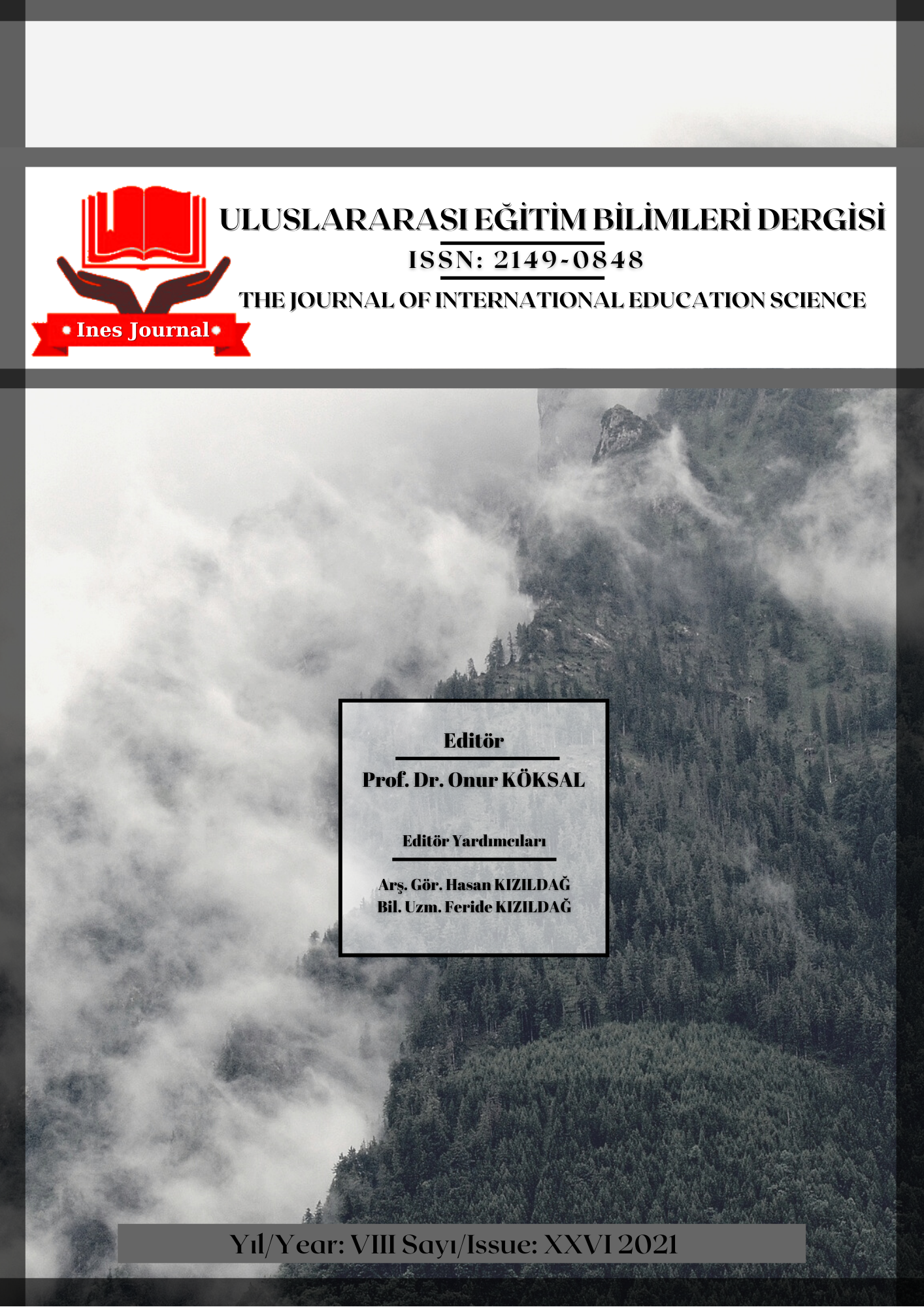THUS SPOKE THE TENGRI ‘DO NOT EVEN SAY HUMPH’ CHILD RESPONSIBILITY IN THE CONTEXT OF PHILOSOPHY, CULTURE AND RELIGIOUS BELIEF
Author :
Abstract
Çocuğun kişilik yapısının temellerinin ailede oluştuğu ve ailenin çocuğun eğitim yaşantısı, meslek seçimi gibi birtakım alanlarda etkili olduğu düşünülürse anne ve babanın çocuk üzerindeki etkisi belirgin bir şekilde ortaya konulmaktadır. Bununla birlikte çocuğun toplumsal değerleri ve alışkanlıkları aile ortamında edindiği dikkate alınırsa ebeveyn çocuk arasındaki olumlu etkileşim çok değerli olmaktadır. İşlevsel bir ortamda büyüyen çocuk, bağımsız bir yetişkin olarak karşımıza çıkmaktadır. İslam geleneğinde çocuğun ebeveynine nazik olması ve birtakım hizmetler sağlaması gerekmektedir. Çocuğun ebeveynine olan sorumluluğu Allah’a olan birtakım görevlerinden hemen sonra gelmektedir. Bu gelenekte Allah’ın buyurduklarına ters olmamak koşuluyla evladın ebeveynine itaat etmesi gerekmektedir. Bununla birlikte aynı koşul geçerli olmak üzere evladın Müslüman olmayan ebeveynine de nezaket çerçevesinde itaat etmesi gerekmektedir. Çocukların gelişim gereksinimlerini karşılayacak olan kişiler öncelikle anne-babalar ve öğretmenlerdir. Bu kişiler, çocukların biyolojik, psikolojik, sosyal ve ahlaki gelişim özelliklerini iyi bilmeli ve bu bilgiler ışığı altında hareket etmelidirler. Anne-babalar ve öğretmenler, çocukların sağlıklı, yeterli ve dengeli beslenmelerine özen göstermeli ve zihinsel gelişimlerine paralel olarak çocukların davranışlarında dışa bağımlılıktan kurtulup özerk bir kişiliğe kavuşmalarına yardımcı olmalıdırlar.
Keywords
Abstract
Considering that the foundations of the child's personality structure are formed in the family and that the family is effective several areas such as the child's educational life and choice of profession, the effect of the parents on the child is prominent. However, the positive interaction between the parent and the child is very valuable considering the social values and habits of the child in the family environment. The child who grows in a functional environment is seen as an independent adult. In the Islamic tradition, the child must be polite and provide a number of services. The child's responsibility to his or her parents comes immediately after a number of duties to God. In this tradition, the child must obey his parents, provided that they do not contradict God's command. However, the same condition applies to the son's non-Muslim parent should also obey in the framework of courtesy. Mother-fathers and teachers are the individuals who conduct the children’s developmental requirements. These individuals should know well children’s biological, psychological, social and moral developmental features and they should behave in the light of these information. Mother-fathers and teachers should take care of children’s healthy, efficient and balanced diet, and they should help children’s behavior to become free from the external dependence in parallel to their cognitive development and become an independent individual.
Keywords
- Birditt, Kira, Fingerman, Karen, Lefkowitz, Eva &Dush, Claire; Parents Perceived As Peers: Filial Maturity İn Adulthood, J Adult Dev, 15, 2008, 1-12.
- Blustein, Jeffrey; On The Duties Of Parents And Children, The Ethics Of The Family, 1977, 427- 441.
- Cicirelli, Victor. G.;Attachment And Obligation As Daughters' Motives For Care Giving Beha- vior And Subsequent Effect On Subjective Burden, Psycohology And Aging, 8 (2), 1993, 144−155.
- English, Jane; What Do Grown Children Owe Their Parents?, N.S Jecker. (Eds.), Aging And Ethics. Contemporary İssues İn Biomedicine, Ethics, And Society. 1992, 147-154.
- Fenton, Cameron; Who counts as a parent fort he purposes of filial obligations?,Journal of App- lied Ethics, 11 (1), 2017, 17-32.
- Finch, Janet Ve Mason, Janethen; Negotiating Family Responsibilities, London: Taylor & Francis E- Library. 1993.
- Fredriksen, Karen ve Scharlach, Andrew; Filial Maturity: Analysis and Reconceptualiza- tion, Journal of Adult Development, 3 (3), 1996, 183-191.
- Han, Sung Dong; Ethical Partialism And Filial Obligations: An Analysis Of Human Relations- hips Within The Family, Unpublished Doctoral Dissertation, Nebraska: University Of Nebraska, 1996.
- Hanson, Sandra, Sauer, William &Seelbach, Wayne; Racial And Cohort Variations İn Filial Responsibility Norms, The Gerontologist, 23 (6), 1983, 626-631.
- Laanemets, Mart; The Conception Of Filial Piety in Early Confucian Texts, Studie, 4 (2), 1996, 139-147.
- Marcoen, Alfons; Filial Maturity of Middle-AgedAdult Children in the Context of Parent Care: Model and Measures, Journal of Adult Development, 2 (2), 1995, 125-136.
- Nichols, Ryan; The Origins And Effects Of Filial Piety (Xiao孝): How Culture Solves An Evolu- tionary Problem For Parents, Journal Of Cognition And Culture, 13, 2013, 201–230.
- Özen, Y. ve Er, E. (2019). Biz babadan Böyle Gördük-Evlat Sorumluluğu-( We See This By The Father-Filial Responsibility) Yaşam Becerileri Psikoloji Dergisi.( Life Skills Journal of Psychology) 3 (5), 2019, 13-22
- Seelbach, Wayne; Gender Differences İn Expectations For Filial Responsibility, The Gerontolo- gist, 17 (5), 1977, 421-425.
- Sung, Kyu-Taik; A New Look At Filial Piety: İdeals And Practices Of Family-Centered Parent Care İn Korea, The Gerontological Society Of America, 30 (5), 1990, 610-617.
- Sung, Kyu-Taik; Measures And Dimensions Of Filial Piety İn Korea, The Gerontologist, 35 (2), 1995, 240-247.
- Vaughan- Brakman, Sarah; A Philosophical Analysis Of Filial Obligations, Unpublished Docto- ral Thesis, Uk: Rice University, 1994.
- Wee, Cecilia; Filial Obligations: A Comparative Study, A Journal of Comparative Philosophy, 13, 2014, 83-97.
- Turan, İbrahim; Günümüz Aile Problemleri Çerçevesinde Kur’an’da Ebeveyn Çocuk İlişkisi, (In The Context of Family Problems in Our Day The Relationship Between Child and Parents in the Qur’an ) Ondokuz Mayıs Üniversitesi İlahiyat Fakültesi Dergisi, 2013, no:
- White, James, Klein, David.,&MartinTodd.; Family Theories: An İntroduction. Thousand Oaks, Ca: Sage. 2015.





